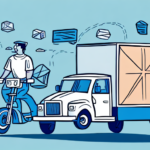How to Become an Independent Courier and Enjoy the Benefits of Self-Employment
If you're looking to take control of your career and embrace the freedom of self-employment, becoming an independent courier might be the ideal path for you. This comprehensive guide will walk you through everything you need to know to start and grow a successful independent courier business.
Understanding the Role of an Independent Courier
An independent courier is a self-employed individual who delivers parcels and packages for businesses or individuals. Unlike traditional delivery jobs, independent couriers manage their own schedules, client base, and business operations. This autonomy allows for greater flexibility and the potential to earn a substantial income based on effort and efficiency.
Benefits of Being an Independent Courier
- Flexible Schedule: Choose your working hours to fit your lifestyle.
- Control Over Workload: Decide how many clients and deliveries you take on.
- Income Potential: Opportunity to earn more by efficiently managing your deliveries.
- Personal Fulfillment: Build and grow your own business, enhancing job satisfaction.
Data-Driven Insights
According to a recent industry report, the demand for independent couriers has increased by 25% over the past year, driven by the surge in e-commerce and on-demand delivery services.
Pros and Cons of Being an Independent Courier
Like any entrepreneurial venture, being an independent courier comes with its own set of advantages and challenges.
Advantages
- Autonomy: Be your own boss and make decisions that directly impact your business.
- Diverse Opportunities: Work with various industries, from retail to healthcare.
- Scalability: Expand your business by taking on more deliveries or hiring additional couriers.
- Skill Development: Enhance skills in time management, customer service, and logistics.
Challenges
- Client Acquisition: Building a steady client base can be difficult initially.
- Financial Management: Handling expenses, taxes, and profits requires careful planning.
- Initial Investment: Costs for equipment and transportation can be substantial upfront.
- Competition: Standing out in a crowded market requires strategic marketing and excellent service.
Steps to Start Your Independent Courier Business
Launching your own courier business involves several key steps. Here's a detailed roadmap to guide you through the process:
1. Conduct Market Research
Analyze the local market to identify demand, competition, and potential niches. Utilize resources like the ShipScience Market Analysis to gain insights into industry trends and customer needs.
2. Define Your Niche
Specializing in a particular type of delivery can set you apart. Options include:
- Medical Deliveries: Transporting pharmaceuticals and medical supplies.
- Food Delivery: Partnering with restaurants and food services.
- Fragile Items: Handling delicate and high-value packages with care.
3. Set Competitive Pricing
Determine your pricing structure based on factors like distance, package size, and delivery speed. Ensure your rates are competitive yet profitable by considering all operational costs.
4. Acquire Necessary Tools and Equipment
Invest in reliable transportation, whether it's a vehicle, bicycle, or scooter, depending on your service area. Additionally, essential tools include a GPS system, smartphone, and delivery management software.
5. Register Your Business
Legally establish your business by registering it with the appropriate authorities. Obtain any necessary licenses and insurance to protect your operations and clients.
6. Market Your Services
Promote your courier business through various channels:
- Online Marketing: Create a professional website and leverage social media platforms.
- Local Advertising: Use flyers, business cards, and partnerships with local businesses.
- Networking: Attend local business events and join industry associations.
Overcoming Challenges and Standing Out in the Market
Success in the independent courier industry requires strategic planning and adaptability. Here are strategies to overcome common challenges:
Client Acquisition Strategies
- Build Relationships: Establish trust with initial clients to encourage repeat business and referrals.
- Offer Promotions: Attract new clients with discounts or special offers for first-time deliveries.
- Utilize Online Platforms: Join courier marketplaces and gig platforms to expand your reach.
Efficient Financial Management
Use accounting software to track expenses, manage invoices, and ensure timely tax filings. Consider consulting with a financial advisor to optimize your budgeting and financial planning.
Embracing Technology
Stay competitive by integrating the latest technology, such as:
- Delivery Management Software: Streamline operations and improve efficiency.
- GPS Tracking: Provide real-time tracking for clients, enhancing transparency and trust.
- Automated Scheduling: Optimize delivery routes and scheduling to save time and fuel.
Future Trends in the Independent Courier Industry
The courier industry is evolving rapidly with advancements in technology and changing consumer expectations. Staying ahead of these trends can position your business for long-term success.
Growth of E-Commerce
The continuous rise of e-commerce drives demand for reliable and swift delivery services. Independent couriers can capitalize on this trend by offering specialized services tailored to online retailers.
Adoption of Green Delivery Practices
Environmental sustainability is becoming increasingly important. Implementing eco-friendly practices, such as using electric vehicles or bicycles, can attract environmentally conscious clients and reduce operational costs.
Integration of Autonomous Vehicles and Drones
Emerging technologies like autonomous delivery vehicles and drones are set to revolutionize the delivery landscape. While these technologies may present competition, they also offer opportunities for couriers to adopt innovative solutions and enhance service offerings.
Success Stories: Learning from Independent Couriers
Drawing inspiration from successful independent couriers can provide valuable insights and strategies for your own business.
John's Specialized Delivery Service
John found success by specializing in delivering fragile and high-value items. By investing in specialized packaging and handling procedures, he built a reputation for reliability, securing long-term contracts with high-end retailers and art galleries.
Maria's Customer-Centric Approach
Maria focused on exceptional customer service, maintaining regular communication with clients and promptly addressing any concerns. Her dedication to client satisfaction resulted in a loyal customer base and consistent repeat business.
Conclusion
Becoming an independent courier offers the flexibility and potential for a rewarding self-employed career. By following a structured approach, embracing technology, and prioritizing excellent service, you can build a successful courier business that stands out in a competitive market. With determination and strategic planning, the benefits of self-employment as an independent courier are well within your reach. For more detailed insights and industry resources, visit ShipScience.




















